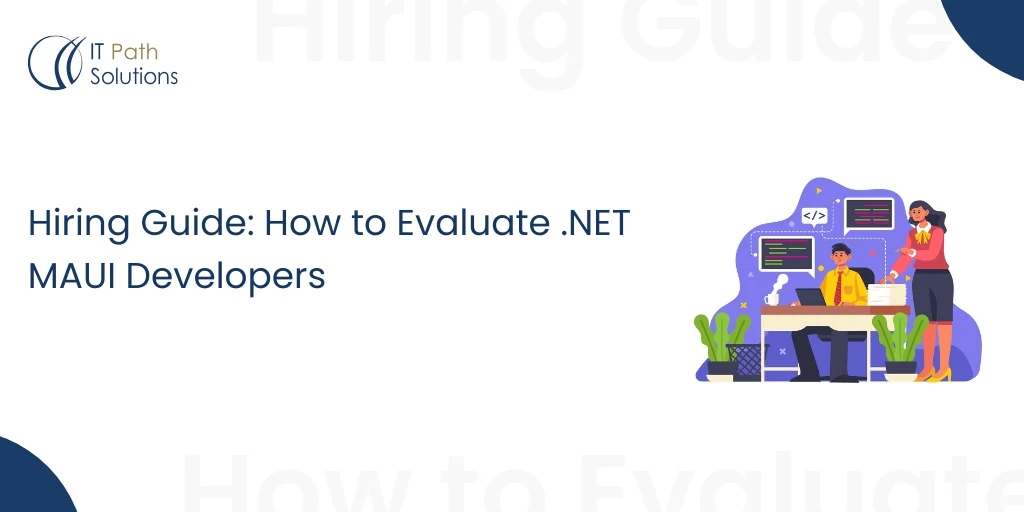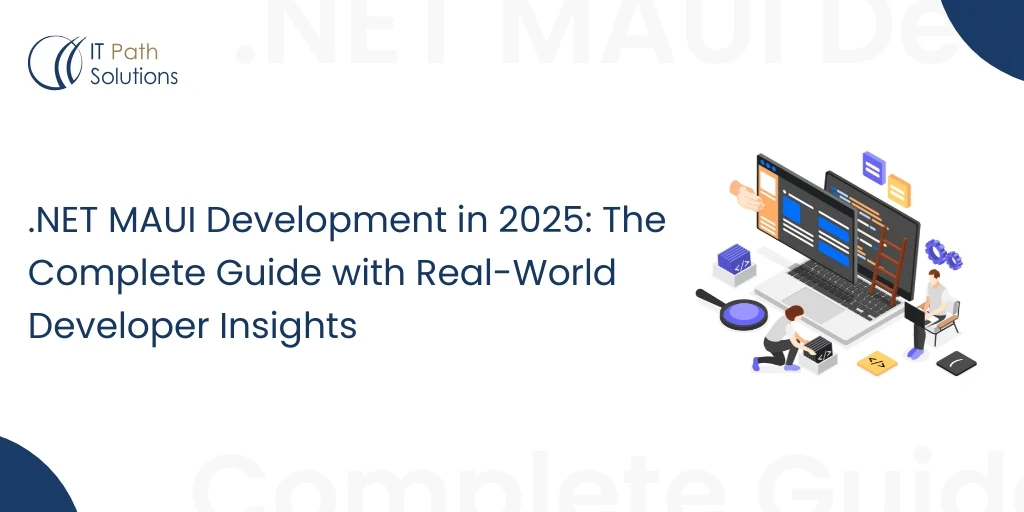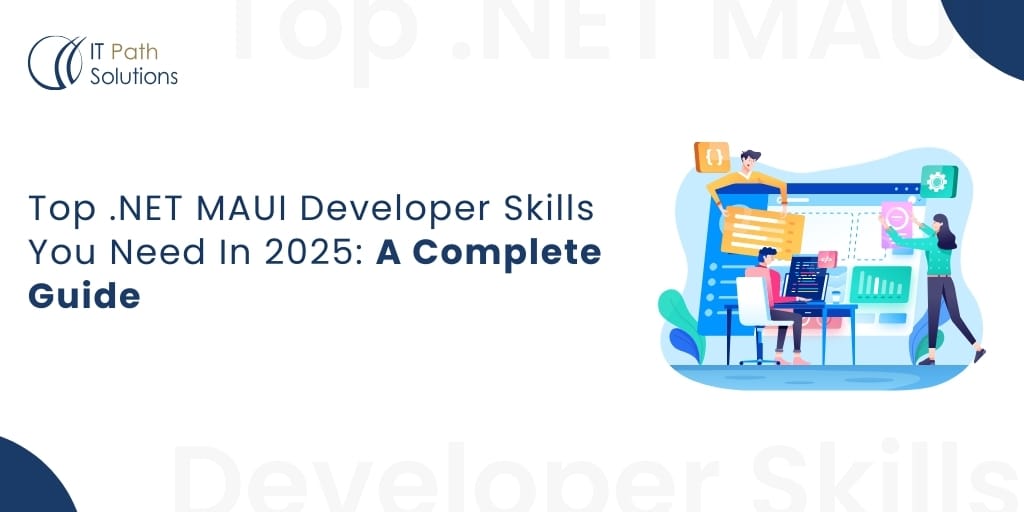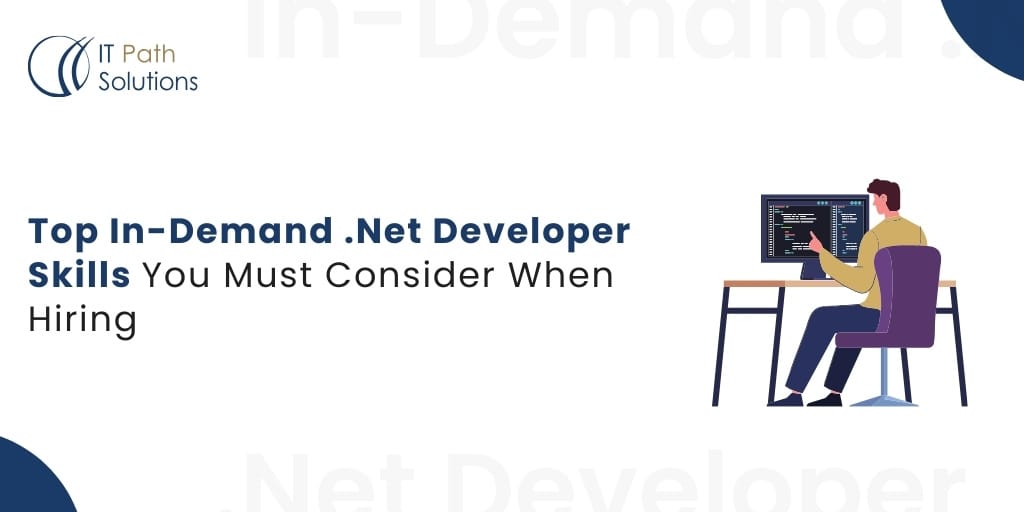Hiring Guide: How to Evaluate .NET MAUI Developers

Finding the right .NET MAUI developers can make or break your cross-platform development project. Whether you’re seeking individual developers or a comprehensive development company, understanding what to look for ensures you build a team capable of delivering high-quality, maintainable applications across all platforms.
This comprehensive guide walks you through the essential skills, evaluation criteria, interview questions, and red flags to watch for when hiring .NET MAUI talent.
Essential Skills for .NET MAUI Developers
Understanding what to look for when you hire .NET MAUI developers requires clarity on both technical and soft skills.
Core Technical Proficiencies
C# Mastery and .NET Fundamentals
A solid grasp of C#, .NET 6 or later, and object-oriented design principles are foundational. Developers should be comfortable with:
- Modern C# features (async/await, LINQ, pattern matching)
- Dependency Injection and IoC containers
- SOLID principles and clean code practices
XAML for UI Design
Developers should possess expertise in using XAML to create elegant, responsive, and reusable UI components. Understanding data binding, converters, and styles is crucial.
Architectural Pattern Knowledge
Understanding both MVVM (Model-View-ViewModel) and MVU (Model-View-Update) patterns ensures cleaner, maintainable, and scalable code.
Platform-Specific API Access
Knowledge of invoking native APIs through platform services is crucial for handling device-specific tasks like camera or location access.
Advanced Development Capabilities
Asynchronous Programming
Fluent use of async and await ensures smooth, responsive interfaces without blocking the main thread. This is non-negotiable for professional development.
REST API Integration
Seasoned developers should effortlessly integrate REST or GraphQL services, manage authentication, and handle data flows efficiently.
Database Management
Experience with local storage (SQLite) and cloud solutions (Azure Cosmos DB, Firebase) helps manage online and offline data seamlessly.
Testing and CI/CD
MAUI developers should know how to write unit tests using MSTest, NUnit, or xUnit, debug apps across multiple device simulators, and work with Azure DevOps, GitHub Actions, or similar tools.
When evaluating a .NET MAUI development company, assess their team’s proficiency across these technical dimensions. Look for portfolios demonstrating successful .NET MAUI Android app development and .NET MAUI iOS app development projects.
The Complete .NET MAUI Developer Role Explained
A .NET MAUI developer is more than a programmer; they’re problem-solvers who create seamless applications that work across Android, iOS, Windows, and macOS using a shared codebase.
Core Responsibilities
Daily Activities Include:
- Designing and building multi-platform applications using .NET MAUI
- Sharing and reusing code efficiently across mobile and desktop
- Integrating third-party services and APIs
- Customizing UI and behavior based on platform needs
- Optimizing performance and reducing technical debt
- Writing unit tests and supporting CI pipelines
- Maintaining clean code practices and documentation
Specialization Areas
When you hire .NET MAUI developers, consider these specialization areas:
.NET MAUI Android App Development: Expertise in Android-specific features, Material Design principles, and Google Play deployment.
.NET MAUI iOS App Development: Knowledge of iOS Human Interface Guidelines, Apple ecosystem integration, and App Store submission process.
.NET MAUI Desktop App Development: Experience with Windows and macOS desktop UI patterns, file system integration, and platform-specific features.
.NET MAUI App Design: Skills in creating responsive, accessible, and visually appealing interfaces that work across all platforms.
Whether you’re looking to hire .NET MAUI freelancers for short-term projects or seeking a comprehensive .NET MAUI development company for ongoing support, understanding these specializations helps set clear expectations.
Soft Skills That Distinguish Exceptional Developers
While a developer’s technical toolkit may get the job done, soft skills elevate the quality of experience and outcomes.
Critical Human Capabilities
Adaptability
.NET MAUI evolves rapidly, so developers must be open to learning and pivoting quickly when technologies shift or new platform updates are released. This is especially important given the framework’s relatively recent maturity.
Communication
Proficient developers can explain technical choices confidently, document code effectively, and understand business goals. Strong verbal and written skills are pivotal.
Problem-Solving
Cross-platform development often introduces edge cases and platform quirks. The ability to think critically and resolve issues creatively is vital. Forum discussions reveal that successful MAUI developers are those who can troubleshoot effectively.
Collaboration
Working with designers, testers, product managers, and other developers leads to better alignment and smoother development cycles.
Continuous Learning
Top .NET MAUI developers regularly explore new libraries, tools, and patterns, keeping them sharp and forward-looking. They follow GitHub discussions, participate in community forums, and stay updated on framework evolution.
Pragmatic Optimism
Understanding both the capabilities and limitations of the framework, successful developers maintain realistic expectations while leveraging MAUI’s strengths.
These qualities become especially important when providing .NET MAUI app support and maintenance ongoing projects require developers who communicate well and adapt to changing requirements.
Hiring Guide: How to Evaluate .NET MAUI Developers
Whether you’re seeking to hire .NET MAUI developers individually or partner with a comprehensive .NET MAUI development company, choosing the right team significantly impacts project success.
Evaluation Criteria for Developers
Technical Assessment Areas:
| Area | What to Check | Why It Matters |
| C# and XAML Proficiency | Ask for examples of clean, scalable code and UI definitions | These are core technologies in .NET MAUI development |
| MVVM or MVU Knowledge | Test how they structure projects and separate concerns | Ensures modular, testable, and maintainable codebases |
| Cross-Platform Understanding | Review apps they’ve built for both mobile and desktop | Shows ability to create adaptive, platform-aware solutions |
| REST API Integration | Discuss how they manage API calls, data parsing, and error handling | Most MAUI apps connect to cloud or backend services |
| Database Usage | Ask about experience with SQLite or Azure Cosmos DB | Strong data management is essential in cross-platform apps |
| UI and Responsiveness | Request a walk-through of responsive UI they created | Indicates attention to performance and usability |
Essential Interview Questions
Technical Questions:
- How do you handle platform-specific features in .NET MAUI?
- Look for answers involving dependency injection, conditional compilation, and platform-specific implementations
- Good candidates should mention using #if directives, platform folders, or DependencyService/DI patterns
- Describe a time when you solved a performance issue in a cross-platform app.
- Listen for specific examples with measurable outcomes
- Strong answers include profiling tools used, root cause identification, and solution implementation
- What tools do you use for testing and debugging in MAUI?
- Should mention unit testing frameworks (xUnit, NUnit, MSTest)
- Knowledge of device emulators, physical device testing, and debugging tools
- Familiarity with Hot Reload and its limitations
- How do you approach state management in MAUI applications?
- Look for understanding of MVVM, observable collections, and data binding
- Knowledge of state management libraries or patterns
- Understanding of navigation and lifecycle management
- Explain your experience with Xamarin and your migration to MAUI.
- If they have Xamarin background, assess their understanding of differences
- Look for practical migration experience and challenges overcome
- Understanding of why MAUI represents an improvement
Architectural Questions:
- How do you structure a large MAUI application for maintainability?
- Look for Clean Architecture, MVVM, or similar patterns
- Feature-based vs. layer-based organization
- Dependency management and separation of concerns
- When would you choose the MVVM vs MVU pattern?
- Understanding of both patterns
- Ability to assess project requirements and choose appropriately
- Knowledge of trade-offs between approaches
- How do you handle offline data synchronization?
- Local database strategies (SQLite)
- Sync logic and conflict resolution
- Network availability detection
- User experience during sync operations
Problem-Solving Scenarios:
- An app crashes only on iOS but works fine on Android. How do you troubleshoot?
- Systematic debugging approach
- Platform-specific logging and error handling
- Understanding of iOS-specific requirements (Info.plist, entitlements)
- Use of Xcode Console for native crashes
- The app UI is laggy during data loading. What’s your approach?
- Async/await implementation
- UI virtualization techniques
- Background threading
- Loading indicators and user feedback
- Performance profiling tools
- You need to integrate a native library only available on one platform. How do you proceed?
- Platform-specific implementations using dependency injection
- Understanding of binding libraries
- Conditional compilation strategies
- Fallback options for unsupported platforms
Red Flags to Watch
Technical Red Flags:
Relying heavily on third-party plugins without understanding the core framework
- Indicates surface-level knowledge
- May lead to maintenance issues when plugins become outdated
Poor Git hygiene or lack of version control experience
- No clear commit history or meaningful commit messages
- Unfamiliarity with branching strategies
- No experience with pull requests or code reviews
Unwillingness to write tests or follow structured architectural patterns
- Claims “testing slows down development”
- No examples of unit tests in portfolio
- Disorganized code structure
No real-world experience deploying apps to both mobile and desktop platforms
- Only tutorial or sample app experience
- Never dealt with app store submission processes
- Unfamiliar with platform-specific requirements
Unable to discuss specific challenges they’ve faced with MAUI
- Only talks about successes, never problems
- Can’t articulate lessons learned
- Limited troubleshooting experience
Dismissive of platform-specific requirements
- “Write once, run anywhere” mentality without nuance
- Ignores platform design guidelines
- No consideration for platform-specific user expectations
No familiarity with recent MAUI updates and improvements
- References only early versions or documentation
- Unaware of current best practices
- Not following framework evolution
Communication Red Flags:
Unable to explain technical concepts in business terms Defensive when asked about code decisions Poor documentation habits Unclear or inconsistent communication style Unwilling to ask clarifying questions
Process Red Flags:
No experience with agile methodologies Unfamiliar with CI/CD pipelines Resistance to code reviews No examples of collaborative work
Evaluating Development Companies
When assessing a .NET MAUI development company, consider:
Portfolio and Experience
Review Past Projects:
- Look for applications similar to your needs
- Check diversity of projects (mobile, desktop, various industries)
- Request case studies with measurable outcomes
- Verify apps are actually in app stores if claimed
Industry Expertise:
- Experience in your specific industry vertical
- Understanding of regulatory requirements (healthcare, finance)
- Domain knowledge that reduces your explanation burden
Check App Store/Play Store Listings:
- Download and test their published apps
- Read user reviews for quality insights
- Check update frequency (indicates ongoing maintenance)
Technical Depth
Team Proficiency:
- Ask about team composition and experience levels
- Request developer CVs or LinkedIn profiles
- Understand their hiring and training processes
- Assess collective years of MAUI/Xamarin experience
Platform-Specific Optimizations:
- How do they handle iOS-specific features?
- Android Material Design implementation approach
- Desktop application experience
- Cross-platform design consistency strategies
DevOps Practices:
- CI/CD pipeline implementation
- Automated testing coverage
- Deployment processes
- Version control and branching strategies
- Code quality tools and standards
Service Range
End-to-End Capabilities:
- Do they offer design, development, testing, and deployment?
- UI/UX design capabilities and process
- QA and testing methodologies
- Post-launch support options
.NET MAUI App Support and Maintenance:
- What maintenance packages do they offer?
- Response times for critical issues
- Update and enhancement processes
- Long-term support availability
Migration Services:
- Can they handle Xamarin Forms to .NET MAUI migration?
- Legacy modernization experience
- Risk assessment and mitigation strategies
- Migration timeline and methodology
Communication Standards
Project Management Approach:
- What methodologies do they use? (Agile, Scrum, Kanban)
- Project management tools and transparency
- Sprint planning and review processes
- Stakeholder involvement expectations
Reporting and Transparency:
- Frequency of status updates
- Reporting format and detail level
- Access to project tracking systems
- Demo and review schedules
Responsiveness:
- Response time during consultation phase
- Communication channels offered
- Availability across time zones
- Escalation procedures for urgent issues
Platform Specialization
Confirm Expertise:
- .NET MAUI Android app development portfolio pieces
- .NET MAUI iOS app development examples
- .NET MAUI desktop app development experience
- Breadth of platform coverage in past projects
Design Guidelines Adherence:
- Material Design implementation quality
- Human Interface Guidelines compliance
- Windows and macOS design patterns
- Accessibility standards implementation
Cost Analysis: Budgeting for .NET MAUI Development
Understanding the financial investment required for .NET MAUI app development services helps in planning and decision-making.
Development Cost Factors
Initial Development Costs:
- Simple applications: $15,000 – $40,000
- Medium complexity apps: $40,000 – $100,000
- Enterprise-grade applications: $100,000 – $300,000+
Factors Affecting Cost:
- Application complexity and feature count
- UI/UX design requirements
- Backend integration complexity
- Number of third-party service integrations
- Platform-specific customizations needed
- Testing and QA requirements
- Documentation needs
Ongoing Costs
.NET MAUI App Support and Maintenance:
- Basic maintenance: $500 – $2,000/month
- Active development and updates: $2,000 – $10,000/month
- Enterprise support packages: $10,000+/month
Additional Considerations:
- App store fees (Apple: $99/year, Google: $25 one-time)
- Cloud hosting and services (varies by usage)
- Third-party API subscriptions
- SSL certificates and domain costs
- Analytics and monitoring tools
ROI Considerations
Cost Savings vs. Native Development:
- 40-50% reduction in development costs compared to separate iOS and Android apps
- 50-60% reduction in ongoing maintenance costs
- Faster time-to-market leading to earlier revenue generation
- Smaller team requirements (one cross-platform team vs. multiple native teams)
Cost Considerations When Hiring
When to Hire Different Types of Talent
Freelancers:
- Best for: Small projects, specific features, short-term needs
- Pros: Lower cost, flexibility, specialized skills
- Cons: Limited availability, single point of failure, less accountability
- When to choose: Prototype development, specific module implementation, temporary capacity increase
Development Agencies:
- Best for: Complete projects, ongoing support, team scalability
- Pros: Full team, diverse expertise, established processes
- Cons: Higher cost, less control, potential communication overhead
- When to choose: Full application development, complex requirements, need for comprehensive support
Full-time Employees:
- Best for: Long-term product development, continuous updates
- Pros: Dedicated resource, deep product knowledge, full control
- Cons: Highest total cost, recruitment overhead, ongoing HR management
- When to choose: Core product development, long-term roadmap, building internal capability
Hidden Costs to Consider
Onboarding Time:
- Time to understand your business domain
- Learning existing codebase (if applicable)
- Team integration and process alignment
Communication Overhead:
- Time zone differences for offshore teams
- Language barriers
- Cultural differences in work style
Quality Issues:
- Rework due to misunderstandings
- Technical debt from poor initial implementation
- Additional testing required
Knowledge Transfer:
- Documentation requirements
- Training internal team
- Handover processes
Conduct Trial Projects
Before committing to large contracts:
- Start with a small, defined project (2-4 weeks)
- Evaluate code quality, communication, and delivery
- Assess problem-solving and adaptability
- Test collaboration and feedback incorporation
Check References Thoroughly
Questions to Ask References:
- “What were the biggest challenges in working with this developer/company?”
- “How did they handle changing requirements?”
- “Would you hire them again? Why or why not?”
- “How was their communication and responsiveness?”
- “Did they deliver on time and within budget?”
Trust Your Instincts
Beyond technical skills and process fit:
- Do they understand your business goals?
- Are they enthusiastic about your project?
- Do they ask insightful questions?
- Do you feel confident in their judgment?
- Can you imagine a long-term partnership?
Working with IT Path Solutions: Your .NET MAUI Partner
At IT Path Solutions, we understand the unique challenges of cross-platform development. Our experienced team specializes in .NET MAUI solutions tailored to your business objectives.
Our .NET MAUI Services
Comprehensive Development Services:
- Custom .NET MAUI app development from concept to deployment
- .NET MAUI Android app development with Material Design excellence
- .NET MAUI iOS app development following Apple’s Human Interface Guidelines
- .NET MAUI desktop app development for Windows and macOS
- .NET MAUI app design focusing on responsive, accessible interfaces
Migration and Modernization:
- Expert Xamarin Forms to .NET MAUI migration services
- Legacy app modernization and performance optimization
- Architecture assessment and improvement recommendations
Ongoing Support:
- .NET MAUI app support and maintenance packages
- Performance monitoring and optimization
- Regular updates aligned with .NET releases
- Bug fixes and feature enhancements
Why Choose IT Path Solutions
✅ Proven Track Record: Successfully delivered MAUI projects across healthcare, finance, retail, and enterprise sectors
✅ Technical Excellence: Our developers combine deep C# expertise with comprehensive cross-platform experience
✅ Honest Communication: We set realistic expectations and communicate transparently about capabilities and constraints
✅ End-to-End Service: From initial consultation through deployment and maintenance, we’re with you every step
✅ Flexible Engagement Models: Whether you need to hire .NET MAUI freelancers for short-term projects or a dedicated team for ongoing development
✅ Business-Focused Approach: We understand that technology serves business goals, not the other way around
Our Development Process
- Discovery & Planning: Understand your requirements, assess technical feasibility, define scope
- Architecture Design: Create scalable, maintainable architecture aligned with best practices
- Iterative Development: Regular sprints with continuous feedback and adjustment
- Testing & QA: Comprehensive testing across all target platforms
- Deployment: Smooth app store submission and deployment support
- Ongoing Support: Maintenance, updates, and continuous improvement
Conclusion
Hiring the right .NET MAUI developers or development company requires careful evaluation of technical skills, soft skills, experience, and cultural fit. By understanding what to look for, asking the right questions, and watching for red flags, you can build a team capable of delivering high-quality cross-platform applications.
Remember that the cheapest option is rarely the best value. Invest in developers who demonstrate not just technical competence but also communication skills, problem-solving ability, and genuine enthusiasm for your project. The right team will save you time, money, and frustration in the long run.
At IT Path Solutions, we’re committed to being that right partner for your .NET MAUI development needs. Contact us to discuss how we can help bring your cross-platform vision to life.
 Healthcare
Healthcare  Education
Education  Real Estate
Real Estate  Logistic
Logistic  Themes
Themes
 Plugins
Plugins
 Patterns
Patterns





